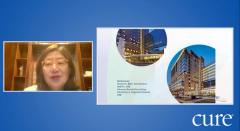
Educated Patient® Lung Cancer Summit Molecular Testing and Adjuvant Targeted Therapies Presentation: October 1, 2022
Watch Dr. Anne Chiang, from Yale School of Medicine, discuss molecular testing and adjuvant targeted therapies during the CURE Educated Patient Lung Cancer Summit.
Episodes in this series

Molecular testing is critical for patients with lung cancer to obtain the benefits of targeted therapies, which has been shown to be effective with minimal side effects, an expert discussed in her presentation.
“There are lots of people who have lung cancer, but there are different kinds of lung cancer,” said Dr. Anne Chiang, associate professor at the Yale School of Medicine in New Haven, Connecticut, in an interview with CURE®. “And the more we know about those different kinds and how to treat them specifically, then I think we can be more effective in our treatments, No. 1. But then we can also avoid side effects that we don’t need to have if you’re using a different therapy that maybe is broader.”
Chiang further discussed the importance of understanding each patient’s specific lung cancer through molecular testing to further guide treatment with targeted therapy at CURE®’s Educated Patient® Lung Cancer Summit.
She explained that molecular testing is performed on every patient with lung cancer after they undergo a biopsy. The tissue that is taken during biopsy is assessed by sequencing the DNA to identify any alterations or mutations.
“It’s the tissue itself from (a patient’s) cancer that’s tested. That’s the gold standard right now,” Chiang said. “It is required because if (a patient) has one of these mutations that allows us to direct the treatment towards that mutation. That’s kind of the idea of personalized medicine, is to really try to treat (a patient’s) particular cancer and the features that it has.”
What Chiang highlighted in her discussion that results from molecular testing can lead to the use of targeted therapy, particularly which one is best for a specific patient. Targeted therapy is a type of cancer treatment that treats certain mutations or alterations in the cancer cells directly. For example, if a patient with lung cancer is discovered to have a
“It’s sort of a match,” she continued. “You have a particular cancer that has an alteration, and then you’ve developed drug that targets (it) … it has the key to the lock, so that you can match them together. That’s why it’s called targeted — because you have a target, and that is what the drug is for.”
Chiang said
In previous clinical trials, results demonstrated that targeted therapy led to better outcomes when taken as first-line treatment for patients with metastatic lung cancer compared to those treated with chemotherapy. Additionally, the side effects were much more manageable. Some of the most common side effects associated with targeted therapy that Chiang mentioned included rash, which can be controlled with a steroid cream, and diarrhea, which is managed with an antibiotic.
“They can be significant, but those are much easier side effects to manage than, for example, chemotherapy (side effects),” she said.
For more news on cancer updates, research and education, don’t forget to














